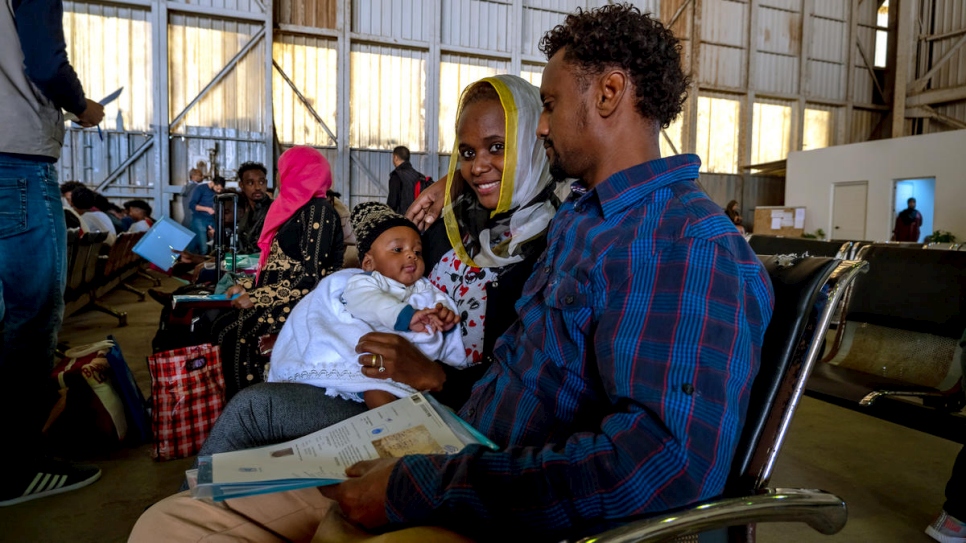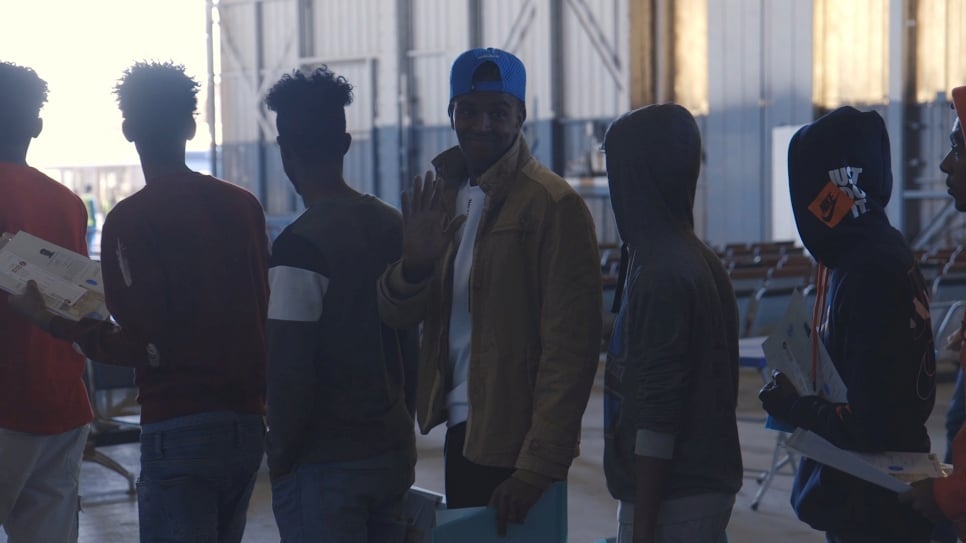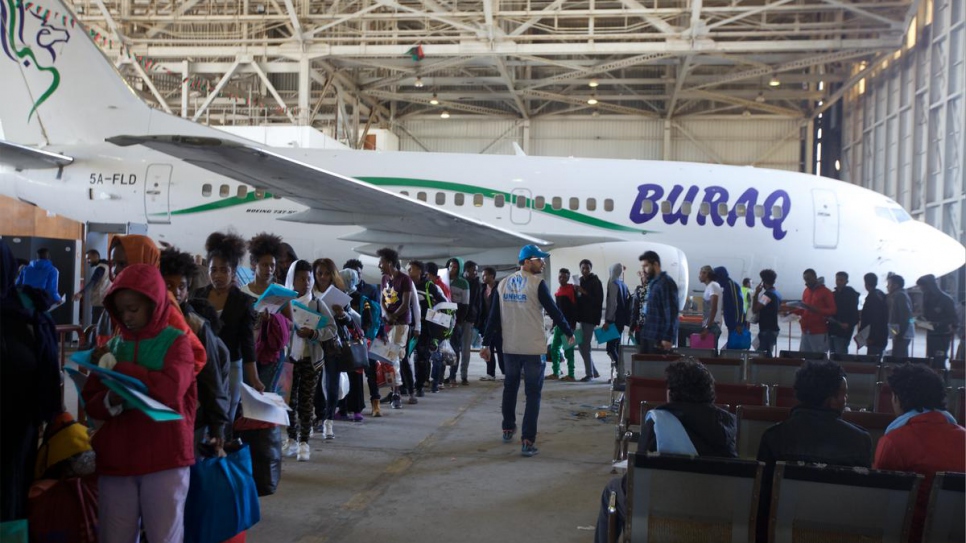There was no fanfare, no jostling of television cameras and no sign of the prime minister or elected officials at the airport to greet them.
Unlike the media frenzy that marked the arrival of the first of 60,000 Syrian refugees to Canada, federal officials have quietly achieved another immigration feat that has largely gone unnoticed: They eliminated one of the country’s worst refugee resettlement backlogs and ushered in 12,000 Eritreans to begin new lives in Canada.
 From left, Debretsion and Senait Abbe and their children, Merken,9, Nerhawi, 10, and Mesuna, 5.
From left, Debretsion and Senait Abbe and their children, Merken,9, Nerhawi, 10, and Mesuna, 5.
They spent three years in Sudanese refugee camp before arriving in Canada, sponsored by family and friends.
Ottawa began tackling the Eritrean backlog in 2015 — at the same time world attention was focused on the desperate plight of Syrian refugees. The Eritreans, who fled President Isaias Afwerki’s oppressive military regime, had been languishing for years in refugee camps in Sudan, where they, again, were often subjected to violence.
But thanks to an inspired collaboration between frontline visa officers on two continents, most of the Eritrean refugees were resettled in Canada by December.
Debretsion Abbe was thrilled when his application to come to Canada was approved and he was issued a permanent residence visa after waiting nearly three years with his family in a refugee camp in the Sudanese capital of Khartoum.
“We felt we were reborn,” said the 48-year-old carpenter, who arrived in Toronto in September with wife, Senait, 38, and their three children, Merhawi, 10, Merken, 9, and Mesuna, 5. They were sponsored by Senait’s brother and friends in Toronto. “We are very happy to be here, to live a peaceful and free life where my children can be educated and have a future.”
“It was tough to live in limbo,” he added, describing the harsh conditions in the camp. “We were afraid of thefts, rapes and being stopped by police who arrested refugees and put us in jail when they needed money.”
Canada has six visa offices in Africa: The Cairo office, one of the smallest overseas operations with just two Canadian officers, is responsible for processing immigration-related applications from Sudan. Through the years, it had been inundated by private sponsorship applications from Eritreans in Sudan.
Knowing it would take ages for their colleagues in Cairo to chip away at the Eritrean backlog, staff at the visa office in Rome — with five Canadian officers and eight local staff — reached out in 2015 and offered to lend a hand.
“That was an ambitious goal at the time,” said Ed Cashman, who was a consul at the Canadian embassy in Khartoum between 2015 and 2018. “I wasn’t sure how they would do it. It was incredible just because of the sheer number of files in Sudan. We had no experience of doing anything like that before.
“These Eritreans had been in camps in Sudan all this time just waiting for a decision (from Canada), some for 10 years. It’s gratifying to see the faces of these people who got their notifications and were finally accepted. Their lives are changed forever in a positive way.”
After the Eritrean files were transferred from Cairo to Rome, the first wave of Eritreans arrived in Canada in 2016. So far, more than 11,690 have landed here.
During the collaboration, officials in Rome made four to six trips to Sudan every year to interview applicants awaiting resettlement while two additional Canada-based decision-makers and two support staff were assigned to help.
The officers would interview refugees in the embassy office in Sudan, which was a four-bedroom house with a reception area to hold eight people at a time, said Cashman, adding it was not really equipped and designed for these interviews.
“You look at the Syrian resettlement project where hundreds of staff were assigned and travelled to the Middle East to process files. Here we had a small team of people doing this all out of Rome on top of other things,” Cashman noted. “The Eritrean resettlement effort was an incredible accomplishment.”

Tekle Bahlibi has helped co-ordinate the community's sponsorship effort since 1987. (Photo Supplied)
The Eritrean initiative was part of the immigration department’s ongoing effort since 2012 to reduce global refugee resettlement backlogs, said department spokesperson Peter Liang.
Previously, the backlog of people around the world waiting to be approved for private sponsorship was staggering, with wait times as long as 10 years. In 2012, the then-Conservative government began capping the number of new applications per year — a policy that has continued under the Liberals. It helps limit the intake while allowing officials to tackle old files. Currently, 88 per cent of private sponsorship applications have been in the system for under two years.
“The department has devoted significant effort and attention to processing older cases of privately sponsored refugees across the network. To increase efficiency, certain streamlined practices put into place during the Syrian refugee resettlement initiative have now become permanently implemented,” said Liang.
Some of those measures, he said, included accepting applications by email, streamlining forms and guides for applicants, and changes to the assessment process to effectively handle complex cases.
While most of the resettled Syrians were supported by private community groups, the Eritreans were mostly sponsored by family and friends who were already established here. The sponsors are still responsible for the newcomers’ initial settlement and financial needs for the first year.
Brian Dyck, national migration and resettlement co-ordinator at Winnipeg’s Mennonite Central Committee, said it was difficult — and risky — for Eritrean refugees to travel from Sudan to Cairo for resettlement interviews, especially during the violence and anti-government uprisings that broke out in Egypt in 2011 during the Arab Spring.
“The older cases got more complicated to finish off. Babies born. People died, married, moved and changed their phone (numbers),” Dyck said of the challenge to keep old files up to date.
He attributed the elimination of the backlog to the Justin Trudeau government’s resolve to let in more privately sponsored refugees to Canada, which has almost doubled to 18,000 over the last three years from 9,350 in 2015.
“The Liberals came in and opened up the bottom of the funnel. That’s a more important factor than the cap in dealing with the situation,” Dyck explained.
News of the clearance of the Eritrean backlog was welcomed by the Eritrean Canadian community, whose members have long criticized the slow processing time for their cases.
“This is a very good news. So many of them have suffered in limbo in Khartoum for years,” said Tekle Bahlibi, who has helped co-ordinate the community’s sponsorship effort since 1987. “It shows us when there’s a political will, things can happen.”





 Eritrean President Isaias Afwerki (left) and Sudanese President Omar al-Bashir (right) during a welcome ceremony in Khartoum, 11 June 2015.Photo: Ashraf Shazly/AFP
Eritrean President Isaias Afwerki (left) and Sudanese President Omar al-Bashir (right) during a welcome ceremony in Khartoum, 11 June 2015.Photo: Ashraf Shazly/AFP Abiy Ahmed (right) and Isayas Afeworki (left)
Abiy Ahmed (right) and Isayas Afeworki (left)





















